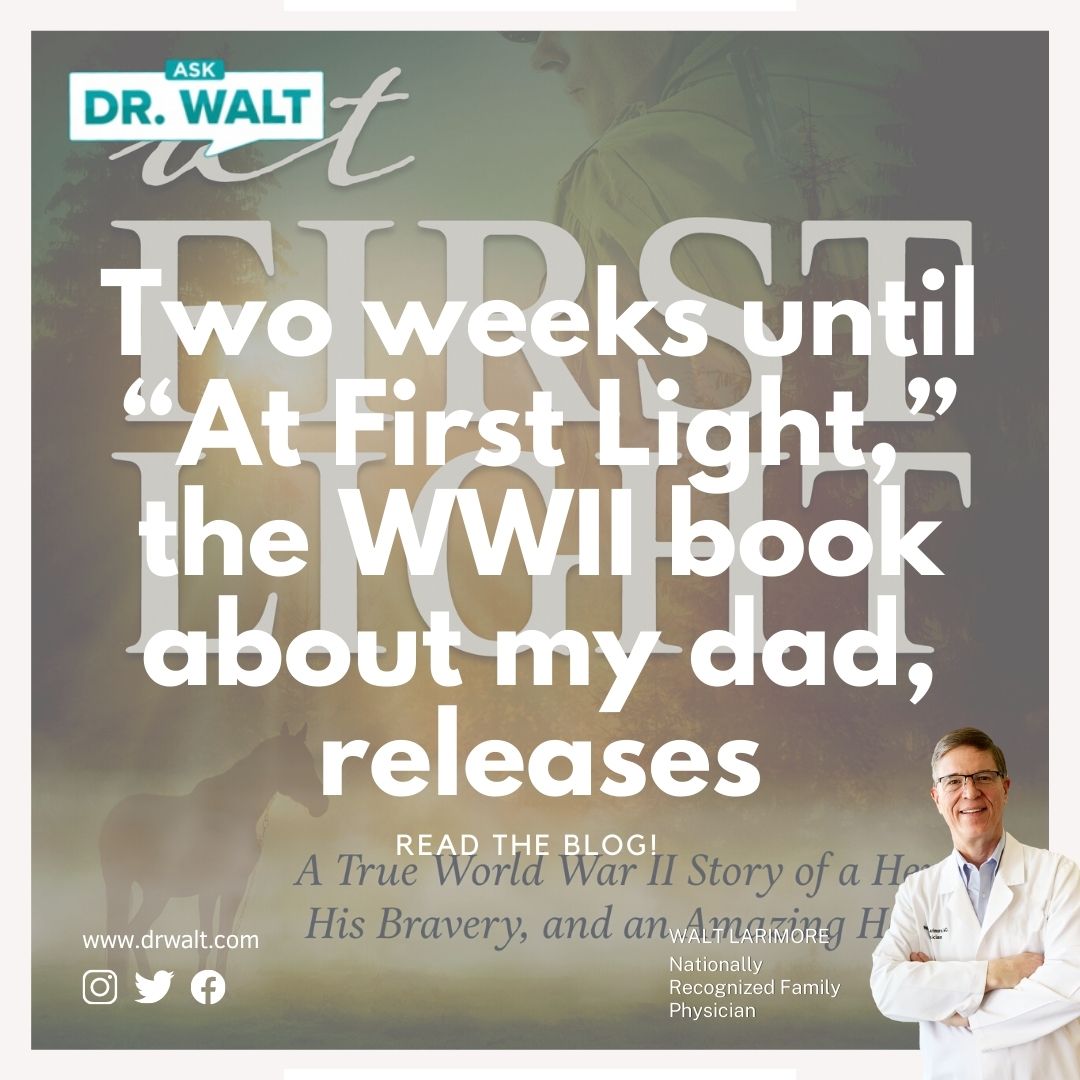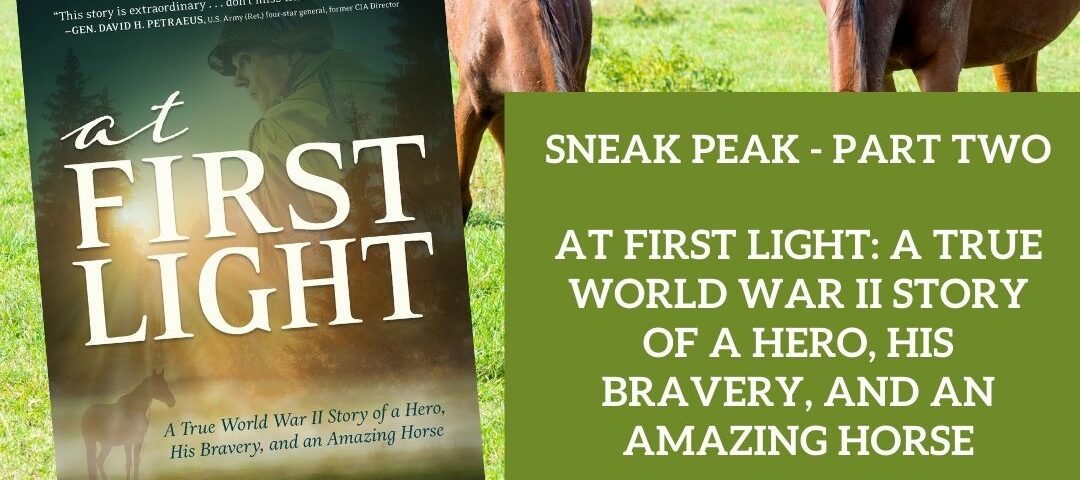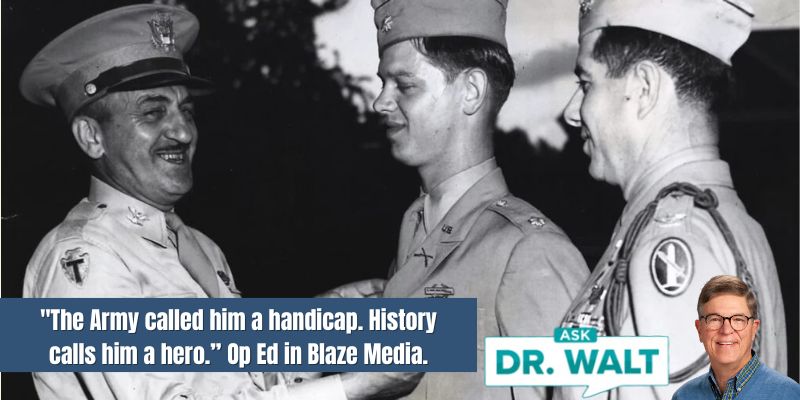
Want to boost the intelligence and cognitive ability of your overweight kid?
April 8, 2022
Nice TV story on my WWII book, “At First Light”
April 10, 2022SNEAK PEAK – Part Two – At First Light: A True World War II Story of a Hero, His Bravery, and an Amazing Horse
With the permission of my publisher, for the month of April, I’m giving you a SNEAK PEEK of the first five chapters of my latest book — a wonderful story about my father’s heroism and exploits before and after World War II. Here’s CHAPTER ONE of At First Light: A True World War II Story of a Hero, His Bravery, and an Amazing Horse.
“As a graduate of West Point, an Army officer for five years, and the head men’s basketball coach at my alma mater and at Duke for the past forty-six seasons, I’ve been blessed to be a part of great teams. I recognize the commitment and discipline required to win at the highest level. These experiences leave me in awe of Phil Larimore and his servant leadership, sensational suffering, and stoic sacrifice. What a fantastic story about a leader whose courage on the battlefield deserves a standing ovation. I highly recommend At First Light.”
—Mike Krzyzewski, Head Men’s Basketball Coach at Duke University and Naismith Hall of Fame member
Order Here
CHAPTER ONE
THE LITTLE STINK
“In your pursuit of your passions, always be young.”
—Tom Brokaw, author of The Greatest Generation
Philip Bonham Larimore, Jr., born January 4, 1925, was about two weeks old when the first letter about his birth arrived at his parents’
home at 565 South Holmes Street in Memphis, Tennessee. The note from his mother’s childhood friend, who lived deep in the backwoods hill
country of north Arkansas, said:
Dearest Ethyl and Philip,
There is nothing that brings the happiness and joy of a little babe. You can never realize just what they mean to you until you keep them awhile and feel your very life bound up in them. I wish I could see the little rascal. Of course, he had to be a Jr. It is almost always that way with the first one. Kiss that little stink for me.
Ever fondly,
Alta
After little Philip began walking and talking precociously early, he never slowed down and quickly became the prophesied little stink. His tendency toward delinquency happened because he was a latchkey child: his father was a Pullman conductor gone for days at a time, and his mother was a legal secretary. A succession of Negro nannies tried to keep him in rein but to no avail. Even two years at Miss Lee’s School of Childhood did not tame him.
During the annual Chi Omega May Festival for Children pageant, four-year-old Philip joined the other pupils of Miss Lee’s for the Alice in Wonderland segment. He was given the part of a bumblebee, along with one of his best friends, Luke McLaurine. Unfortunately, Philip was too hyperactive to remain in the flower he and Luke were assigned to. Master McLaurine screamed at Philip to return to their blossom, which did nothing to affect Philip’s improvised role as a young bee freely buzzing around the stage.
The audience chuckled as his mother sat mortified.
One year later, Philip was no more successful as an elf in Hallowe’en when he couldn’t resist the temptation to trip a witch running across the stage on her broomstick. The young girl picked herself up and then began beating Philip with her broom as they ran off the stage to the amusement and laughter of parents in the audience.
Seeking to instill some values into her child, Ethyl tried religious education, but Philip couldn’t sit still during the services or children’s Sunday school at St. Luke’s United Methodist Church. He did somewhat better at Vacation Bible School, but he was still considered a “rascal” by his teachers. His mother tried evening prayers and reading Christian storybooks, as well as a book of her grandfather’s sermons, The Story of a Happy Life, but the lessons failed to stick.
On trips to the family farms of relatives, the youngster found great joy in hunting, fishing, and most of all, caring for and riding horses. His father taught him how to shoot guns, and by his sixth birthday, Philip could knock kernels of corn off a fence post with a .22-caliber rifle at twenty-five yards while standing, kneeling, or lying prone. His other great skill was getting a running start and mounting a horse and riding bareback.
Because his father was a conductor, the boy could ride the Cotton Belt train to Pine Bluff for free, and did so every weekend so that he could pal around with cousins and friends while hunting, camping, and taking long rides in the woods. Too bad he didn’t cotton as well to schoolwork.
Following his first six-week grading period at his local public school, the first-grader received “unsatisfactory” marks in all his subjects. After significant and painful discipline, as well as parental threats that he would never return to his relatives’ farms in northeast Arkansas or ever ride a horse again, Philip buckled down. He improved his marks to “acceptable” in all disciplines—both academic and behavioral. Throughout his elementary school years, his mother wondered if academic accomplishment prompted his promotion to the next grade, or whether his teachers were just anxious to see him move on.
On Saturdays, when his father was out of town on train trips or his mother was involved in trial preparation, he was forced to attend Miss Lee’s or the Free Art School. He loathed both and did not succeed at either. He often played hooky to spend time at a nearby stable where he could hang around the massive workhorses that pulled carriages or trolleys throughout the city. It was there Philip learned the rudiments of caring for these gigantic yet gentle creatures. He found out that he could innately communicate with them, so much so that one of the grooms told his mother that her son was a natural when it came to horses.
On his ninth birthday, his mother hosted a “duck” birthday party at the Peabody Hotel,ii known for the Mallard ducks that spent their nights in a “rooftop palace” and then marched down a red carpet from the main elevator to a marble fountain in the hotel lobby each morning. After enjoying the day frolicking in the fountain, the ducks would march out in the evening. Both marches were accompanied by a recorded version of John Philip Sousa’s “King Cotton March,” and their “rooftop palace” was an elaborately decorated doghouse.
Philip and his friends were overjoyed to see and play with the Peabody ducks on his birthday. The boys all laughed when, on a dare, Philip sat down on the floor and began calling the ducks. Before long, the drake and his four ladies were camped on Philip’s lap and between his legs.
By fifth grade, he earned the highest marks in physical education and geography, so his mother relented to her son’s pleas to take him out of Miss Lee’s and the Art School and let him spend his Saturdays and Sunday afternoons under the capable supervision of the stable hands.
Philip also became involved with Scouting and joined the local Boy Scout troop, where he found immediate success in Troop 40 of the Chickasaw Council in Memphis and received his Tenderfoot badge in the sixth grade.
A Scout Master gave him a copy of Horace Kephart’s 1906 masterpiece, The Book of Camping and Woodcraft: A Guidebook for Those Who Travel in the Wilderness, which he devoured. The lessons he learned about how to read a map and use a compass were put to good use at Scout camps, where Philip traversed the wildest swamps and the most desolate canyons.
Throughout his adolescent years, wearing camouflage, pathfinding, stalking and trapping game, and identifying every sort of edible plant all became second nature to him. He could dress wild game, catch fish, cook over campfires in the worst weather, and create comfortable camp bedding while setting up a safe camp in any wilderness environment (known as bivouacking). He learned first aid skills and imagined becoming a physician for wilderness expeditions.
His greatest love, though, was being around and riding horses. As a young equestrian, his skills grew. During his summers and holiday breaks, he rode the horses of friends and family, winning various competitions across western Tennessee and northern Arkansas. Rows of blue, red, yellow, and white ribbons covered the movie posters in his bedroom. His equestrian trophies filled several shelves.
Philip often took a trolley to attend horse shows at the Mid-South Fairgrounds a few miles from his home. Other times, he snuck out after bedtime to visit nearby stables. He could not seem to keep away from horses—nor they from him. A wise trainer taught Philip the three most important virtues he needed when around a horse: patience, observation, and humility.
Even the hot-blooded and high-strung Thoroughbreds acted calm around him, and Philip developed an uncanny way to speak to them with finger and hand commands or with an almost inaudible whisper and very low-pitched squeaking sounds. He came to believe the adage that a good rider can hear his horse speak, but a great rider can hear his horse whisper.
“He’s incredible with horses,” one of the grooms told his mom. “He can speak to them and hear them.”
“How does he do it?” his mother asked. “What’s his trick?”
“There’s no magic. No mysticism. He’s curious about them. He seems to recognize that they are his kin. He gives them gentle love and genuine respect. They pick up on it pretty quick.”
The young boy spent his hard-earned yet meager allowance on every Western movie that played downtown. One of the posters in his bedroom pictured the movie cowboy, Tom Mix, and his trusty steed, Tony, the first horse to bear the name “The Wonder Horse.”
Phil was mesmerized by reading books about the Wild West. He would sit on the front porch for hours reading Zane Grey novels and imagining himself as the hero. He’d look up when the freight trains passed by, their beckoning whistles sounding like summoning sirens. The boy would break out in goose bumps, knowing for sure he was being called to some mysterious land, to some great battle—on his favorite horse, of course.
During the first light of each new day, he would imagine the adventures he would experience and the stallion that might take him there.
Philip Larimore Jr. had no idea that many of these dreams would come true.
Order Here
© Copyright WLL, INC. 2022.





